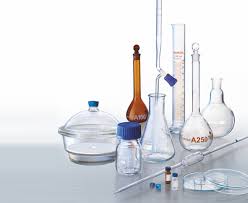What Are Laboratory Chemicals And Why Are They Essential?

Lab chemicalsare important for many scientific experiments, research, and industrial processes. These substances help to carry out accurate tests that form the basics of chemistry, biology, physics, and environmental science. In this blog, we will discuss different types of laboratory chemicals, their uses in scientific work as well as leading laboratory chemicals manufacturers and suppliers in India.
What are Laboratory Chemicals?
Laboratory chemicals are substances used in laboratories for research or experimental purposes such as analysis, synthesis, or for experiment. They can be elements, compounds, or mixtures that serve various roles like reagents for reactions; solvents; indicators, etc.
Common Laboratories Chemicals And Their Uses
Below are some common laboratory chemicals, detailing their specific uses and significance:
Acetic Acid Glacial (1%)
It is a highly concentrated form of acetic acid commonly used as a reagent in chemical reactions at 1% concentration; solvent for different organic syntheses and for pH adjustment of solutions.
Acetocarmine Sulphate (Nucleic Acid)
Acetocarmine Sulphate is primarily used as a stain in microscopy for observing nucleic acids, especially chromosomes during cell division. It Helps enhance the contrast of the structures, making them more visible under microscopes.
Barium Sulphate
Widely employed as a radiopaque agent during medical imaging procedures because it makes certain areas more visible under x-rays than others; also acts as filter material in the plastics industry alongside rubber production and other uses – such filters may remove contaminants from liquids or gasses passing through them based on their pore sizes which allow only desired molecules to pass through while blocking unwanted ones, Analytical chemists often use it when looking at ways of determining sulfate ions within samples.
Carbon Disulphide
Carbon disulfide is a volatile solvent used in chemical synthesis and industrial applications. It is often used for the extraction of oils and fats and in the manufacture of rayon and cellophane
Copper Sulphate
Copper sulfate is widely used in laboratories for various purposes, including as a reagent in Fehling’s solution for testing reducing sugars, as a fungicide, and in the preparation of Bordeaux mixture for agricultural use.
Potassium And Sodium Tartrates
These potassium and sodium tartrates are used in laboratories as reagents in Fehling’s solution and in the food industry as emulsifiers and acidity regulators. They are also involved in the manufacture of some medicinal products.
Potassium Bromide
Infrared spectroscopy samples are commonly prepared using Potassium Bromide. As a reagent in analytical chemistry with applications within the pharmaceutical industry there were also other uses.
Potassium Chloride
It is used For the different chemical reactions at laboratories, it is used as a reagent together with being used to prepare buffer solutions. Also, it serves as an electrolyte replenisher during medical treatments.
The Function Of Chemicals And Laboratory Reagents
To create reactions and study the outcomes, substances are used in the lab commonly known as laboratory reagents or chemicals. They are necessary for qualitative as well as quantitative analysis; this helps scientists understand the composition, properties and behavior of different materials. Each may have its own purpose in an experiment so there can be many types of them.
Common Laboratory Reagents
Laboratory Reagents are compounds or mixtures introduced into systems to elicit a chemical reaction or test if one does occur. Some examples include:
- Hydrochloric Acid (HCL)
- Sodium Hydroxide (NaOH)
- Ethanol (C2H5OH)
- Sulphuric Acid (H2SO4)
- Silver Nitrate (AgNO3)
These are some of the most commonly used reagents in labs, they could be used for different analytical methods like titrations, precipitations and for pH adjustments.
Chemical reagent is a substance or compound that is added to a reaction to determine whether it occurs or not. For example Fehling’s solution which can detect reducing sugar by heating after mixing with a sample gives positive results indicated by brick red precipitate showing these sugars were present.
Why Choose Science Lab Export?
Lab chemicals and reagents form the backbone for scientific research and industrial processes worldwide. This is because they enable accurate experimentation, new product development as well as understanding nature better. These products therefore cannot be overlooked be it medical imaging, agricultural testing or even synthesis of chemicals during various experiments we do need them always.
It is important to comprehend different types of Lab chemical, if one wants to succeed academically or professionally in this field. If you require high-quality lab chemicals, consider Science Lab export. As a leading manufacturer and supplier of lab chemicals, we provide wide-range of products to meet our scientific needs.






